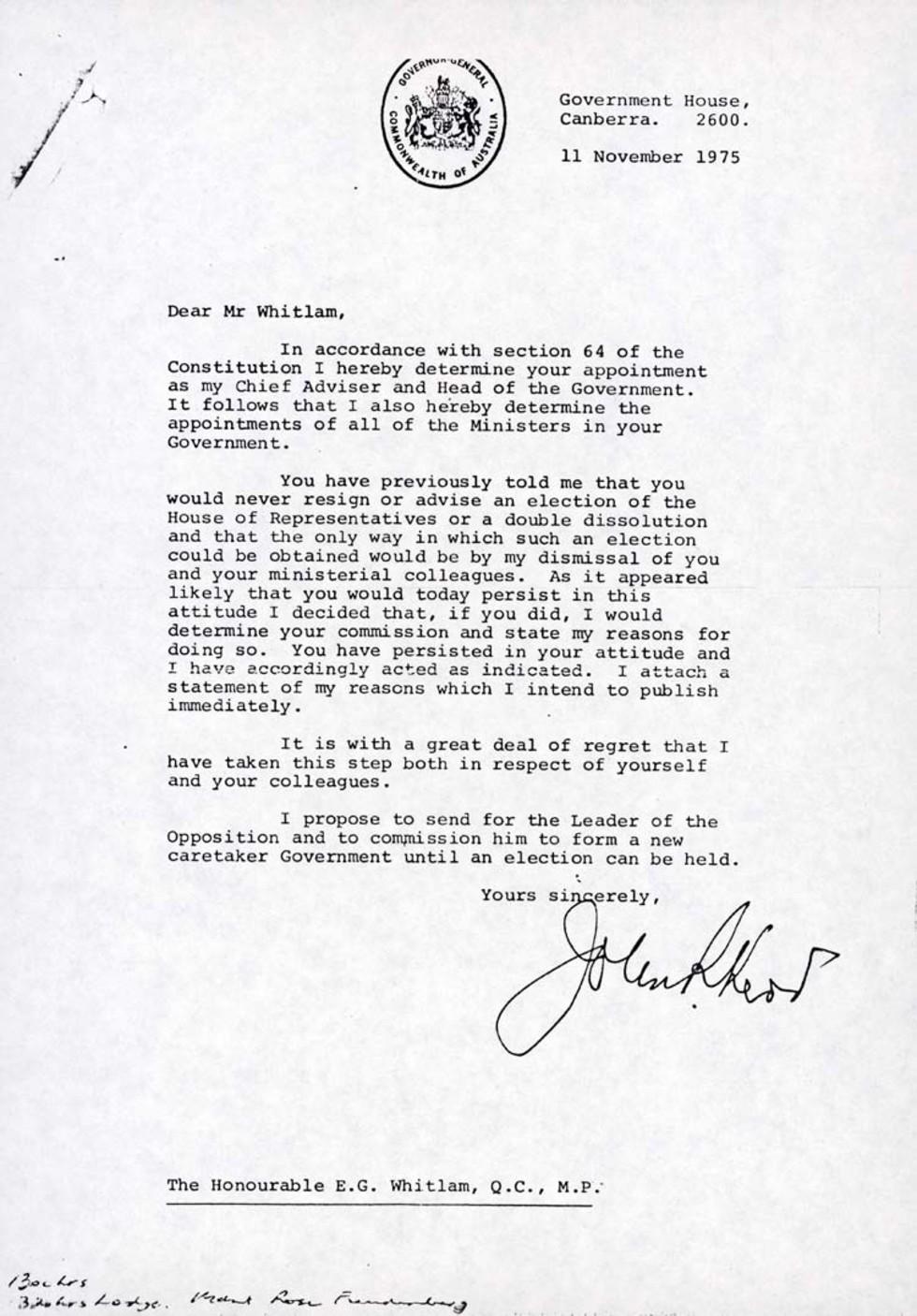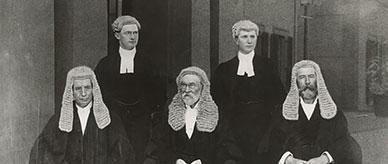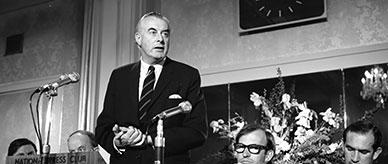


Transcript
[Letterhead showing British coat of arms with text ‘GOVERNOR-GENERAL’, ‘COMMONWEALTH OF AUSTRALIA’.]
GOVERNOR-GENERAL
COMMONWEALTH OF AUSTRALIA
Government House,
Canberra. 2600.
11 November 1975
Dear Mr Whitlam,
In accordance with section 64 of the Constitution I hereby determine your appointment as my Chief Adviser and Head of Government. It follows that I also hereby determine the appointments of all of the Ministers in your Government.
You have previously told me that you would never resign or advise an election of the House of Representatives or a double dissolution and that the only way in which such an election could be obtained would be by my dismissal of you and ministerial colleagues. As it appears likely that you would today persist in this attitude I decided that, if you did, I would determine your commission and state my reasons for doing so. You have persisted in your attitude and I have accordingly acted as indicated. I attach a statement of my reasons which I intend to publish immediately.
It is with a great deal of regret that I have taken this step both in respect of yourself and your colleagues.
I propose to send for the Leader of the Opposition and to commission him to form a new caretaker Government until an election can be held.
Yours sincerely,
[Handwritten signature:] John R. Kerr
[Addressed to:] The Honourable E.G. Whitlam, Q.C., M.P.
[Handwritten annotation at bottom of the page:]
1300 hrs
1320 hrs Lodge. Mant Rose Freudenberg.
About this record
This is the letter that Governor-General Sir John Kerr handed to Gough Whitlam on 11 November 1975, terminating his appointment as Prime Minister of Australia. Written on the Governor-General's letterhead, Kerr’s letter explains that (under section 64 of the Constitution) he has the power to ‘determine’ the appointment of the Australian head of government and of his ministers.
Kerr refers to previous discussions with Whitlam, in which Whitlam had stated that he would never resign or advise an election or double dissolution—and that the only way the Governor-General could obtain such an election would be by dismissing him and his ministers. Because the prime minister has ‘persisted in this attitude’, Kerr has decided to proceed with dismissal.
Educational value
- This letter is the key document in a dramatic event in Australian political history—the dismissal of Prime Minister Gough Whitlam. This letter is the formal document of dismissal.
- On 11 November 1975, Whitlam had gone to Government House in Canberra to meet with the Governor-General, Sir John Kerr. Whitlam had intended to discuss a recommendation he had planned to put to the Governor-General: that a Senate half-election be called. Instead of this, at 1.00 pm, Kerr handed this dismissal letter to Whitlam.
- In his letter, Kerr argues that section 64 of the Australian Constitution gave him the legal power to determine (decide the fate of) the commission of government ministers, including the prime minister. (Specifically, section 64 states that 'the Governor-General may appoint officers to administer such departments of State of the Commonwealth as the Governor-General in Council may establish'.)
- Kerr later stated that he had sought advice from the Chief Justice of the High Court of Australia, Sir Garfield Barwick—and that this advice was a major factor in his decision. On 10 November Barwick had advised Kerr (in writing) that the Governor-General has the authority to withdraw a prime minister’s commission. Not all experts in constitutional law agree, however. Some have expressed doubt that the reserve power of section 64 does in fact enable a Governor-General to dismiss a government that has a majority in the House of Representatives.
- As proposed in his letter to Whitlam, Kerr commissioned Malcolm Fraser as caretaker prime minister. Fraser immediately took steps to use the opposition Liberal–Country Party Coalition's numbers in the Senate to pass ‘supply’ (the budget bills)—thus breaking the deadlock and ending the financial crisis.
- Both houses of parliament were simultaneously dissolved, and a general election was called. In the election, held on 13 December 1975, the Coalition secured a very large majority.
- The termination of Whitlam's commission as prime minister was the culmination of events that began in October 1975. The refusal of the Senate to vote on the government's budget bills had resulted in a deadlock between it and the House of Representatives.
- The Coalition ’had the numbers’ to block supply in the Senate because it had the support of two non-Labor senators. Liberal and Country Party premiers in New South Wales and Queensland had appointed these non-Labor Senators to fill vacant Labor seats—which was a significant break with tradition.
- Malcolm Fraser claimed that the Labor Party was unfit to govern. He referred to the ‘Loans Affair’— the Whitlam government’s attempts to raise $4 billion in foreign loans to help pay for its programs.
- Prime Minister Gough Whitlam had nominated Kerr for Governor-General on 27 February 1974. Despite the controversy surrounding the dismissal, Kerr remained in this role until 1977. Whitlam led the Labor Party, in opposition, until 1977.
- Both men argued that their own positions on the dismissal had been correct. Whitlam has consistently maintained he was the victim of a conspiracy. As recorded in Hansard, Whitlam believed that his dismissal had subverted the parliamentary principle that ‘governments are made and unmade in the House of Representatives—in the people’s House’.
Acknowledgments
Learning resource text © Education Services Australia Limited and the National Archives of Australia 2010.
Related themes
Need help with your research?
Learn how to interpret primary sources, use our collection and more.


